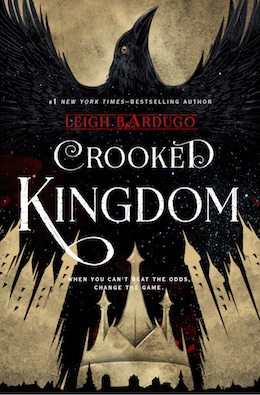Crooked Kingdom is Leigh Bardugo’s fifth novel. It’s also the second volume of the Six of Crows duology, following on from last year’s well-received Six of Crows. Six of Crows was part travelogue and part caper—in its travelogue, reminiscent of Jacqueline Carey’s Kushiel books, albeit without the sex; in its caper, a more murderous Leverage or Hustle.
Crooked Kingdom ditches the travelogue in favour of locating itself firmly within the city of Ketterdam, an analogue of Early Modern Amsterdam where commerce is quite literally the highest god, and where criminality is just as common among the wealthy as among the poor. Kaz Brekker and his crew have just pulled off the heist of their lives, but they were double-crossed by their employer, who’s only one of many people who want to get their hands on the boy Brekker’s crew kidnapped/rescued—and the knowledge in his head.
The merchant Van Eck, formerly Brekker’s client, has kidnapped a member of Brekker’s crew, holding her hostage against what he wants. Inej doesn’t believe that Brekker will redeem her: there’s no profit in it for him. But Brekker might care more for Inej than she gives him credit for. Maybe. Either way, he’s not going to let Van Eck get away with double-crossing him: Crooked Kingdoms is a novel of revenge and double-dealing, of heists nested within heists, grand tricks, and unexpected gambits.
It’s also a book that I find extremely difficult to talk about in specifics, due to its large cast and the complex nested tricks and reveals of its narrative. Bardugo has, it must be acknowledged, a masterful grasp of what makes a good caper, and superb control of the narrative skills it takes to pull that off without coming across as blatantly manipulative. It is, of course: all writing is an act of attempted manipulation, but when every character knows different things, some revealed to the reader, some not, some conflicting, it takes very specific skills to keep the whole process feeling natural instead of grotesquely contrived. Bardugo stays on the right side of this line—at least mostly: there are a couple of moments where the latest reveal seems a little too perfect.
In a novel with half a dozen viewpoint characters, it is an achievement that they all come across as distinct individuals. They don’t all have equal weight: Nina and Matthias, whose respective narrative arcs were more prominent in Six of Crows, fade somewhat into the background here, while Jasper, gambling addict and sharpshooter, and Wylan, Van Eck’s disowned son, come more to the fore. There’s a clever set of oppositions between Jasper’s father, who loves his son, and Wylan’s, who wants his son dead: their respective family backgrounds take on greater significance as Jasper and Wylan fumble their way towards a relationship. The backbone of Crooked Kingdom, though, is Inej and Kaz, and their complicated relationship: loyalty and mistrust, attraction and trauma, and a certain amount of affection lie between them, and between them, they drive the novel’s emotional centre. It’s all about loyalty and lies, after all.
Thematically, Crooked Kingdom is about family and security—family lost, family betrayed, family left behind, the family you want revenge for, the family you want revenge on, the family that hates you and the family that makes you and the family you choose for yourself.
Crooked Kingdom is an ambitious novel. It’s ambitious in what it strives to make look effortless: a large cast, a complex narrative, an emotional payoff worthy of everything that’s gone before. If it doesn’t completely succeed, that’s not really to its discredit.
Because it comes damn close.
Crooked Kingdom is available from Henry Holt & Co.
Liz Bourke is a cranky person who reads books. She holds a Ph.D in Classics from Trinity College, Dublin. Find her at her blog. Or her Twitter.










